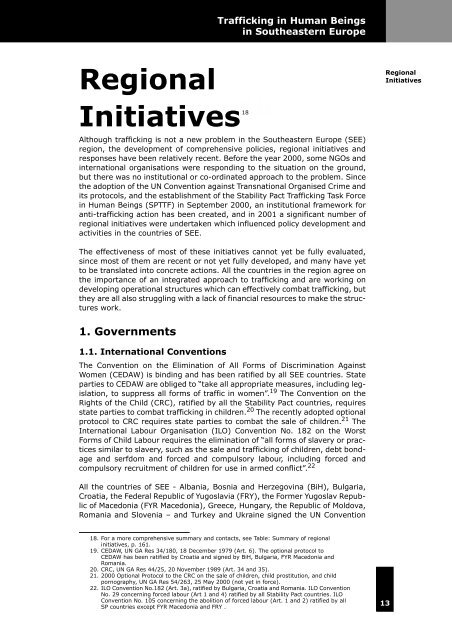Trafficking in Human Beings in Southeastern Europe - Iom
Trafficking in Human Beings in Southeastern Europe - Iom
Trafficking in Human Beings in Southeastern Europe - Iom
- No tags were found...
You also want an ePaper? Increase the reach of your titles
YUMPU automatically turns print PDFs into web optimized ePapers that Google loves.
<strong>Traffick<strong>in</strong>g</strong> <strong>in</strong> <strong>Human</strong> Be<strong>in</strong>gs<strong>in</strong> <strong>Southeastern</strong> <strong>Europe</strong>RegionalInitiatives 18Although traffick<strong>in</strong>g is not a new problem <strong>in</strong> the <strong>Southeastern</strong> <strong>Europe</strong> (SEE)region, the development of comprehensive policies, regional <strong>in</strong>itiatives andresponses have been relatively recent. Before the year 2000, some NGOs and<strong>in</strong>ternational organisations were respond<strong>in</strong>g to the situation on the ground,but there was no <strong>in</strong>stitutional or co-ord<strong>in</strong>ated approach to the problem. S<strong>in</strong>cethe adoption of the UN Convention aga<strong>in</strong>st Transnational Organised Crime andits protocols, and the establishment of the Stability Pact <strong>Traffick<strong>in</strong>g</strong> Task Force<strong>in</strong> <strong>Human</strong> Be<strong>in</strong>gs (SPTTF) <strong>in</strong> September 2000, an <strong>in</strong>stitutional framework foranti-traffick<strong>in</strong>g action has been created, and <strong>in</strong> 2001 a significant number ofregional <strong>in</strong>itiatives were undertaken which <strong>in</strong>fluenced policy development andactivities <strong>in</strong> the countries of SEE.18RegionalInitiativesThe effectiveness of most of these <strong>in</strong>itiatives cannot yet be fully evaluated,s<strong>in</strong>ce most of them are recent or not yet fully developed, and many have yetto be translated <strong>in</strong>to concrete actions. All the countries <strong>in</strong> the region agree onthe importance of an <strong>in</strong>tegrated approach to traffick<strong>in</strong>g and are work<strong>in</strong>g ondevelop<strong>in</strong>g operational structures which can effectively combat traffick<strong>in</strong>g, butthey are all also struggl<strong>in</strong>g with a lack of f<strong>in</strong>ancial resources to make the structureswork.1. Governments1.1. International ConventionsThe Convention on the Elim<strong>in</strong>ation of All Forms of Discrim<strong>in</strong>ation Aga<strong>in</strong>stWomen (CEDAW) is b<strong>in</strong>d<strong>in</strong>g and has been ratified by all SEE countries. Stateparties to CEDAW are obliged to “take all appropriate measures, <strong>in</strong>clud<strong>in</strong>g legislation,to suppress all forms of traffic <strong>in</strong> women”. 19 The Convention on theRights of the Child (CRC), ratified by all the Stability Pact countries, requiresstate parties to combat traffick<strong>in</strong>g <strong>in</strong> children. 20 The recently adopted optionalprotocol to CRC requires state parties to combat the sale of children. 21 TheInternational Labour Organisation (ILO) Convention No. 182 on the WorstForms of Child Labour requires the elim<strong>in</strong>ation of “all forms of slavery or practicessimilar to slavery, such as the sale and traffick<strong>in</strong>g of children, debt bondageand serfdom and forced and compulsory labour, <strong>in</strong>clud<strong>in</strong>g forced andcompulsory recruitment of children for use <strong>in</strong> armed conflict”. 22All the countries of SEE - Albania, Bosnia and Herzegov<strong>in</strong>a (BiH), Bulgaria,Croatia, the Federal Republic of Yugoslavia (FRY), the Former Yugoslav Republicof Macedonia (FYR Macedonia), Greece, Hungary, the Republic of Moldova,Romania and Slovenia – and Turkey and Ukra<strong>in</strong>e signed the UN Convention18.For a more comprehensive summary and contacts, see Table: Summary of regional<strong>in</strong>itiatives, p. 161.19. CEDAW, UN GA Res 34/180, 18 December 1979 (Art. 6). The optional protocol toCEDAW has been ratified by Croatia and signed by BiH, Bulgaria, FYR Macedonia andRomania.20.CRC, UN GA Res 44/25, 20 November 1989 (Art.34 and 35).21.2000 Optional Protocol to the CRC on the sale of children, child prostitution, and childpornography, UN GA Res 54/263, 25 May 2000 (not yet <strong>in</strong> force).22. ILO Convention No.182 (Art. 3a), ratified by Bulgaria, Croatia and Romania. ILO ConventionNo. 29 concern<strong>in</strong>g forced labour (Art 1 and 4) ratified by all Stability Pact countries. ILOConvention No. 105 concern<strong>in</strong>g the abolition of forced labour (Art. 1 and 2) ratified by allSP countries except FYR Macedonia and FRY .13
















